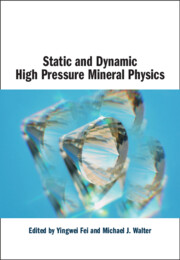Book contents
- Static and Dynamic High Pressure Mineral Physics
- Static and Dynamic High Pressure Mineral Physics
- Copyright page
- Contents
- Contributors
- 1 Introduction to Static and Dynamic High-Pressure Mineral Physics
- 2 Development of Static High-Pressure Techniques and the Study of the Earth’s Deep Interior in the Last 50 Years and Its Future
- 3 Applications of Synchrotron and FEL X-Rays in High-Pressure Research
- 4 Development of Large-Volume Diamond Anvil Cell for Neutron Diffraction: The Neutron Diamond Anvil Cell Project at ORNL
- 5 Light-Source Diffraction Studies of Planetary Materials under Dynamic Loading
- 6 New Analysis of Shock-Compression Data for Selected Silicates
- 7 Scaling Relations for Combined Static and Dynamic High-Pressure Experiments
- 8 Equations of State of Selected Solids for High-Pressure Research and Planetary Interior Density Models
- 9 Elasticity at High Pressure with Implication for the Earth’s Inner Core
- 10 Multigrain Crystallography at Megabar Pressures
- 11 Deformation and Plasticity of Materials under Extreme Conditions
- 12 Synthesis of High-Pressure Silicate Polymorphs Using Multi-Anvil Press
- 13 Investigation of Chemical Interaction and Melting Using Laser-Heated Diamond Anvil Cell
- 14 Molecular Compounds under Extreme Conditions
- 15 Superconductivity at High Pressure
- 16 Thermochemistry of High-Pressure Phases
- Index
5 - Light-Source Diffraction Studies of Planetary Materials under Dynamic Loading
Published online by Cambridge University Press: 03 August 2023
- Static and Dynamic High Pressure Mineral Physics
- Static and Dynamic High Pressure Mineral Physics
- Copyright page
- Contents
- Contributors
- 1 Introduction to Static and Dynamic High-Pressure Mineral Physics
- 2 Development of Static High-Pressure Techniques and the Study of the Earth’s Deep Interior in the Last 50 Years and Its Future
- 3 Applications of Synchrotron and FEL X-Rays in High-Pressure Research
- 4 Development of Large-Volume Diamond Anvil Cell for Neutron Diffraction: The Neutron Diamond Anvil Cell Project at ORNL
- 5 Light-Source Diffraction Studies of Planetary Materials under Dynamic Loading
- 6 New Analysis of Shock-Compression Data for Selected Silicates
- 7 Scaling Relations for Combined Static and Dynamic High-Pressure Experiments
- 8 Equations of State of Selected Solids for High-Pressure Research and Planetary Interior Density Models
- 9 Elasticity at High Pressure with Implication for the Earth’s Inner Core
- 10 Multigrain Crystallography at Megabar Pressures
- 11 Deformation and Plasticity of Materials under Extreme Conditions
- 12 Synthesis of High-Pressure Silicate Polymorphs Using Multi-Anvil Press
- 13 Investigation of Chemical Interaction and Melting Using Laser-Heated Diamond Anvil Cell
- 14 Molecular Compounds under Extreme Conditions
- 15 Superconductivity at High Pressure
- 16 Thermochemistry of High-Pressure Phases
- Index
Summary
Fundamental data on planetary materials under extreme conditions are required to establish physics-based models of planetary interiors and impact events. Dynamic compression experiments provide a means of studying material properties under the conditions of planetary interiors. Experimental shock wave studies also present a unique capability to study impact phenomena in real time, providing insight into hypervelocity collisions relevant to planetary formation and evolution. Recent experimental developments have extended the types of measurements that are possible during the nanosecond to microsecond duration of shock experiments – opening entirely new lines of inquiry. New facilities that couple dynamic compression platforms with high-flux X-ray sources have allowed for in situ X-ray diffraction under dynamic loading. Such experiments can address a range of longstanding questions, including the following: What crystallographic phases are stable under what conditions? What is their thermoelastic behavior? When do they melt or vaporize? And what phases will form on release? Answers to these questions and others will provide input for next-generation models of the structure, dynamics, and evolution of planetary interiors as well and natural impact processes.
- Type
- Chapter
- Information
- Static and Dynamic High Pressure Mineral Physics , pp. 93 - 112Publisher: Cambridge University PressPrint publication year: 2022



